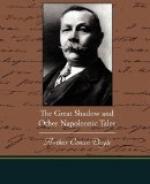“Them’s the chaps!” cried our old sergeant. “They’re gluttons to fight, they are. And you see them regiments with the great high hats in the middle, a bit behind the farm? That’s the Guard, twenty thousand of them, my sons, and all picked men—grey-headed devils that have done nothing but fight since they were as high as my gaiters. They’ve three men to our two, and two guns to our one, and, by God! they’ll make you recruities wish you were back in Argyle Street before they have finished with you.”
He was not a cheering man, our sergeant; but then he had been in every fight since Corunna, and had a medal with seven clasps upon his breast, so that he had a right to talk in his own fashion.
When the Frenchmen had all arranged themselves just out of cannon-shot we saw a small group of horsemen, all in a blaze with silver and scarlet and gold, ride swiftly between the divisions, and as they went a roar of cheering burst out from either side of them, and we could see arms outstretched to them and hands waving. An instant later the noise had died away, and the two armies stood facing each other in absolute deadly silence—a sight which often comes back to me in my dreams. Then, of a sudden, there was a lurch among the men just in front of us; a thin column wheeled off from the dense blue clump, and came swinging up towards the farm-house which lay below us. It had not taken fifty paces before a gun banged out from an English battery on our left, and the battle of Waterloo had begun.
It is not for me to try to tell you the story of that battle, and, indeed, I should have kept far enough away from such a thing had it not happened that our own fates, those of the three simple folk who came from the border country, were all just as much mixed up in it as those of any king or emperor of them all. To tell the honest truth, I have learned more about that battle from what I have read than from what I saw, for how much could I see with a comrade on either side, and a great white cloud-bank at the very end of my firelock? It was from books and the talk of others that I learned how the heavy cavalry charged, how they rode over the famous cuirassiers, and how they were cut to pieces before they could get back. From them, too, I learned all about the successive assaults, and how the Belgians fled, and how Pack and Kempt stood firm. But of my own knowledge I can only speak of what we saw during that long day in the rifts of the smoke and the lulls of the firing, and it is just of that that I will tell you.
We were on the right of the line and in reserve, for the Duke was afraid that Boney might work round on that side and get at him from behind; so our three regiments, with another British brigade and the Hanoverians, were placed there to be ready for anything. There were two brigades of light cavalry, too; but the French attack was all from the front, so it was late in the day before we were really wanted.




